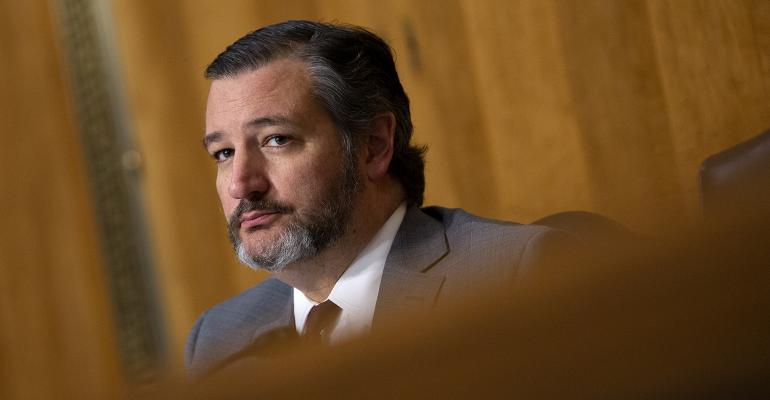By Laura Davison
(Bloomberg) -- Senator Ted Cruz is pressuring Treasury Secretary Steven Mnuchin to quickly deliver a tax cut to investors by indexing capital gains to inflation, a move that he said would encourage savings, investment and innovation.
Cruz, along with 20 other Senate Republicans, sent a letter to Mnuchin on Monday urging him to index the tax on gains made from real estate, stocks or bonds so investors would pay less when selling an asset than they would under existing law.
Current “treatment punishes taxpayers for the mere existence of inflation and is inherently unfair,” the letter said. “Other tax provisions such as individual tax brackets are rightly adjusted for inflation annually. Capital gains ought to receive the same treatment.”
Cruz and the other GOP senators argue that Mnuchin has authority to make the change through regulation without involving Congress, though previous administrations have concluded that can’t be done. The effort comes as President Donald Trump is looking for issues to win favor with voters and donors during his 2020 re-election campaign. Democrats in the House and Republicans in the Senate are unlikely to agree on any tax cut legislation in the coming months.
Mnuchin, so far, has been hesitant to making the change, which Trump’s other top economic advisers support. National Economic Council Director Larry Kudlow has championed the idea for years.
“Right now there’s no commitment to getting it done or not getting it done,” Mnuchin told Bloomberg News in an interview earlier this month. “It’s a policy that has been under consideration and remains under consideration.”
The change would adjust the original purchase price so no tax is paid on appreciation tied to inflation.
To pursue that proposal, the White House would need to sidestep Congress, which has the sole authority to cut tax rates. Instead, Trump is considering an executive order that would direct the Treasury Department to make the change via regulations.
Ryan Ellis, a conservative lobbyist pushing for this change, says that Mnuchin and others in the administration believe that having public support from Republicans in Congress would help make White House officials more comfortable with a unilateral move.
Nearly a dozen Democratic senators, led by Sherrod Brown, of Ohio, sent a letter to Mnuchin earlier this month urging Mnuchin to abandon idea. The administration has “questionable authority” to “lavish tax cuts upon our country’s wealthiest,” the letter said.
That would amount to a tax cut worth more than $100 billion over a decade, according to the Penn Wharton Budget Model. About 95% of the benefit from indexing capital gains to inflation would accrue to the top 5% of taxpayers, according to the analysis. Capital gains taxes don’t apply to common tax-favored retirement vehicles such as 401(k)s or individual retirement accounts. Taxpayers pay ordinary rates on those savings.
“You can soundly put me in the camp that I don’t think the economic effects will be very large or very noticeable,” Kyle Pomerleau, an economist at the right-leaning Tax Foundation, said. “If this is the strategy to juice the economic before the election, this is certainly not the best way to do it.”
To contact the reporter on this story:
Laura Davison in Washington at [email protected]
To contact the editors responsible for this story:
Joe Sobczyk at [email protected]
Anna Edgerton





